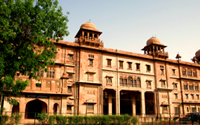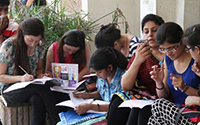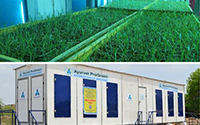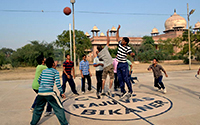Adoption of Information and Communication Technology
The campus at Bikaner is now in complete connectivity with 1 GBPS lease line. All hostels, entire the and even staff colony the been brought under connectivity through OFC network. Smart Class Room System compatible to use efficiently internet has been brought in use for effective and more efficient delivery in theory and practical instructional hours. Almost every department of University has well equipped seminar hall including internet connectivity. Resultantly, it has improved the teaching capacity of faculties. The faculty has resorted to use of power point presentation during instructional hours. The improvement in the research and bibliographical portion of the thesis is quite evident. The students have also started applying to other foreign universities for seeking admission to pursue higher education. The availability of 24X7 free internet access in hostels has also improved the status of surfing, social networking and use of email by students. Likewise at CVAS, Vallabhnagar departments, library and administrative office has been brought under internet connectivity and at PGI-VER, Jaipur also the internet connectivity has been facilitated appreciably to allow internet access to all segments of the institute. Further, to enhance the efficient use of ICT with University and improve communication with farmers the ultimate target group of University to render better extension services a toll free helpline and SMS advisory services has been started by the University
On Screen Evaluation System (OSES)
For the first time in the history of Rajasthan, RAJUVAS has implemented On Screen Evaluation and Advanced Examination Management System (OSES), which may act as a catalyst to change the existing examination evaluation process. The unique strength of this project lies in its comprehensive and ground-breaking approach to reduce errors and save time in Examination Evaluation process. A pilot project of use of OSES in one examination was run with ITI Ltd. and resultantly University was able to declare result within eight days of completion of exams.
OSES has revolutionized the entire examination process by diligently meeting the requirements of the University in conducting the examination. Examinations are conducted with utmost security and sophistication enabled through cutting-edge communication and Information Technology. The system automates the complete lifecycle of the Examination process which includes online registration of candidates, marks uploading, hall ticket generation, question bank management, question paper generation, automated evaluation up to processing and publication of results. The major other benefits the University is drawing or expecting are Elimination of transport, reducing costs and avoiding risk of lost script, Fairness of marking effectively ensured, without additional logistics, Reduction of time and fatigue of marking exams, increased flexibility in accessing script, Increased vision and transparency, dynamic response to contingencies, effective implementation of directive, Instant availability of results, elimination of keying errors, Instant access to scripts, simplified logistics for exam board and for candidates requesting marked scripts, Reducing the operating and maintenance costs involved with various examinations related work. Increasing overall effectiveness and efficiency of the examination system in the university.
Implementation of “Heritage Gene Bank Concept” for Indigenous Cattle
Sh. Radha Mohan Singh, Hon’ble Union Minister for Agriculture, Govt, of India has briefed about the Rashtriya Gokul Mission. This mission aims to enhance the productivity of the indigenous breeds of India. RAJUVAS, realizing the importance of improving indigenous breeds as social responsibility, has started conservation and improvement work through its Livestock Research Stations (LRSs) with the concept of Heritage Gene Banking in Gaushala and farmers. The LRSs of University are now acting as centres for the development of indigenous breeds and a dependable source for supply of high genetic breeding stock to the farmers and Gaushala in the breeding tract. At present, RAJUVAS is promoting the conservation and development of six indigenous cattle breeds as follows:
- Rathi Cattle Breeding Farm at LRS, Bikaner and LRS, Nohar (Hanumangarh)
- Tharparkar Cattle Breeding Farm at LRS, Chandan (Jaisalmer) and LRS, Beechwal (Bikaner)
- Kankarej Cattle Breeding Farm, LRS, Kodamdesar (Bikaner)
- Sahiwal Cattle Breeding Farm, LRS, Kodamdesar (Bikaner)
- Gir Cattle Breeding Farm at LRS, Vallabhnagar (Udaipur)
- Malvi Cattle Breeding Farm at Dug, Jhalawar.
After formation of RAJUVAS in May 2010, consolidated efforts have been made to improve selected indigenous cattle breeds like Rathi, Tharparkar, Kankarej, Gir and Sahiwal. The University has proud possession of the best indigenous cattle of these five breeds. Scientific breeding and management have led to achieving peak yield of 25 litres per day and the lactation yield has reached to 5000 litres per lactation from some of the indigenous cattle breeds. It is estimated that around 90% of rural household owes indigenous cattle as part of their households. There is tremendous scope in improving indigenous cattle breeds by amalgamating traditional husbandry practices with modem scientific tools.
RAJUVAS has developed elite class animals of indigenous breeds that are producing much more milk than the others. RAJUVAS has also distributed around 450 elite class and disease free high genetic makeup breeding bulls/ bull calves to Gaushalas and progressive farmers, for converting non-descript into high producing cattle population of a particular breed.
University is moving ahead with the concept that by using best upgrading and management practices and improved nutrition it would be possible to generate herds of indigenous cattle breeds with high genetic value at Gaushalas and farmers leading to the creation of heritage gene banks spread throughout the state outside the University farms.
Rain Water Harvesting System
RAJUVAS campus is spread over 6300 sq meter area, which is utilized for harvesting rainwater which otherwise flows out in drains. The University has 5 RCC underground water reservoirs with intake capacity of 9.5 lac litres. These underground tanks are located in different locations in the RAJUVAS and connected through channels for collecting rainwater from roofs of the buildings. When these tanks are full, excess rainwater is diverted into the dry well which recharges the underground level of water. The schematic diagram of rainwater harvesting is enclosed. To check wastage of rainwater along sides of roads, tow walls were built covered by cement blocks.
A layout of Rain Water Harvesting system
Type 1: Harvesting rainwater from buildings
To collect rainwater 5 RCC underground water tanks with total capacity of 9.5 lac litres have been constructed at different locations in the RAJUVAS campus. Out of these, three tanks are of 2.5-lac litres capacity each and two tanks with 1.0 lac litres each capacity, totalling to 9.5 lac litres. Surface and rooftop rainwater is collected in these tanks through pipe and chamber system. Collected water, after filtration, is stored in these tanks and overflow/surplus water is carried to the existing open dry well located within the campus and in two newly constructed soakage wells. It is expected that around 68.00 lac litres of rainwater per annum shall be there for underground recharging. Simultaneously, RAJUVAS shall be able to utilize around 30 lac litres of water for drinking and other purposes. A complete system, including RCC underground tanks, chambers and pipeline system, filters and soakage wells have been constructed. The system is ready for a collection of surface rainwater and rooftop rainwater from existing buildings. The system is constructed in such a way that roof top water from any other building can also be carried to the main system. At present 5 buildings are connected to the main system in the first phase. Remaining buildings of the campus will be connected in the second phase very shortly.
Type 2: Harvesting of road surface rainwater:
For this purpose, toe walls along the sides of roads were built providing around a counselling space between road and toe wall. This space was covered by cement blocks fixed on Trainingsand. The road as well as blocks provided ample slope to allow water to collect along the toe wall. Since, cement blocks have been over sand, space between blocks (1-2 mm) allowed water to percolate into the sand. Toe wail was punctured at appropriate places and GI pipes fitted in the hole across the toe wall. Excess water along the toe walls was allowed through these pipes to the greenery bed providing sufficient water to plants and excess to be percolated in to the earth.
Type 3: Harvesting of rain water accumulated at road junction outside boundary wall of RAJUVAS:
The boundary on the comer of hostel premises at Chaudhary Bhimsen Circle used to have around half a meter deep accumulation of rain water. This accumulated water used to disrupt the traffic at this busy square and leading to damage to NH 11. RAJUVAS thought it proper to harvest this rain water into our own land across the boundary wall. At three places, Hume pipes of 6” diameter , across the wall. Land near the boundary was dressed in a way that its level remains more than one foot lower than the roadside level. having allowed water to flow into our campus and absorbed by the soil. Now RAJUVAS have planned to develop a green belt at this point so that plants get many times more water.
e-Granth: Agri-Info-Gateway
Timely access to information is becoming more and more crucial for survival in every sphere of life and agriculture sector is no exception. Today, quick access to right information has become important. Therefore, the demand for fast access to authentic and credible digital information sources have risen in agriculture/veterinary sector, be it research, education or extension. End to end value chain development requires quick access to the diverse type of information. The e-Granth is one such attempt initiated under the National Agricultural Innovation Project (NAIP) of the Indian Council of Agricultural Research (ICAR).
Digital initiatives: Indian National Agricultural Research System (NARS) is a huge repository of knowledge and information on crop sciences, horticulture, resource management, animal sciences, agricultural engineering, fisheries, agricultural extension and agricultural education. Digital technologies and online access to information resources have brought increased expectation from library and information services. For researchers, fast access to existing scientific outputs and archived scholarly information on his topic of interest is as crucial as current scientific knowledge. The modes of services that librarians and information professionals provide have thus become very important and have undergone fundamental changes over the past few decades. Digital resources, digital services and access technologies continue to create new opportunities, new challenges and new expectations. Looking into the above facts e-Granth project was initiated with the following objectives:
- To create AgriCat which will further be accessed through OPAC.
- To digitize important institutional repositories.
- To strengthen Capacity building for library and information management system.
- Implementation of “Koha” an open source library software.
AgriCat (Union Catalogue):
AgriCat is a union catalogue developed under this project with Online Computer Library Centre (OCLC) partnership. It provides digital access to library recourses of 38 member libraries. RAJUVAS is one of the three Veterinary Universities, which are the partner to this consortium. AgriCat helps in locating and sharing materials among this group of libraries. Duplication of effort in record creation is avoided by pooling the efforts through common electronic protocols. Indian NARS has a very large collection of printed resources in veterinary and animal science, spread all over the country in different libraries and veterinary colleges. AgriCat is a common union catalogue of these valuable archives that allows sharing and online access to researchers, teachers and students and other stakeholders to which they would not otherwise have access. The website of e-Granth can be accessed through the following web addresses www.http://egranth.ac.in/or http://www.egranth.ac.in/AgriCat.html or http://www.agricat. worldcat.org.
NEWS & UPDATES View All
- डेयरी विज्ञान एवं प्रौद्योगिकी महाविद्यालय के छात्रों का शैक्षणिक भ्रमण
- विश्व जूनोसिस दिवस के अवसर पर 22 श्वानों का हुआ रेबीज रोधी टीकाकरण
- विश्व जूनोसिस दिवस पर आयोजित हुई विभिन्न प्रतियोगिताएं
- प्रो. आर.एस. पाल पंतनगर में हुए सम्मानित
- वेटरनरी क्लिनिकस में भामाशाहों ने किए पंखे भेंट
- वेटरनरी विश्वविद्यालय सुरक्षित सड़क मार्ग अभियान के तहत विद्यार्थियों हेतु जागरूकता कार्यक्रम
- वेटरनरी विश्वविद्यालय कतरियासर में जल संरक्षण जागरूकता कार्यक्रम का आयोजन
- वेटरनरी विश्वविद्यालय नवआगन्तुक विद्यार्थियों की हुई फ्रेशर पार्टी
- वेटरनरी विश्वविद्यालय ने मनाया 11वां अन्तर्राष्ट्रीय योग दिवस
- वेटरनरी विश्वविद्यालय शैलेन्द्र देवड़ा ने ग्रहण किया कुलसचिव पद का अतिरिक्त प्रभार
- शैलेन्द्र देवड़ा ने ग्रहण किया कुलसचिव पद का अतिरिक्त प्रभार
- प्रो. शिव कुमार शर्मा को कुलसचिव पद का अतिरिक्त कार्यभार
- एनसीसी यूनिट द्वारा कैडेट्स को प्रदान किये सी सर्टिफिकेट
- वेटरनरी विश्वविद्यालय में मनाया विश्व पर्यावरण दिवस
- डेयरी विज्ञान एवं प्रौद्योगिकी महाविद्यालय ने मनाया विश्व पर्यावरण दिवस
- पारम्परिक बेलगाड़ी की संरचना के तकनीकी सुधार पर मिला पेटेंट
- राजुवास का इंजीनियरिंग एंड टेक्नोलॉजी ने विकसित किया 3डी प्रिंटेड मॉडल
- गांव गढ़ियाला (कोलायत) में जागरूकता शिविर का आयोजन
- वेटरनरी विश्वविद्यालय में मनाया विश्व दुग्ध दिवस
- वेटरनरी विश्वविद्यालय गांव कतरियासर में हुआ निःशुल्क पशुचिकित्सा शिविर का आयोजन
- OPEN TENDER FOR Electric Decoration at CVAS, Bikaner
- OPEN TENDER FOR Garbage collection at CVAS, Bikaner
- OPEN TENDER FOR Supply of General Items at CVAS, Bikaner
- OPEN TENDER FOR Supply of Electric Items at CVAS, Bikaner
- OPEN TENDER FOR Sale of Milk at LRS Kodemdesar
- OPEN TENDER FOR supply multi functional laser printers at CVAS Bikaner
- OPEN TENDER FOR Electrical Items at CVAS Navania
- OPEN TENDER FOR Inverter Split air conditioner (hot and cold) at CVAS, Bikaner
- Rate Contract for Supply of Veterinary Medicine items at RAJUVAS, Bikaner
- Limited tender for agricultural land at LRS Nohar
- Open tender for supply of Air Conditioners at CVAS Bikaner
- Open tender for supply of Water Coolers at CVAS Bikaner
- OPEN TENDER FOR ALL IN ONE PCs at CVAS Bikaner
- OPEN TENDER FOR VETERINARY MEDCINE AND CONSUMABLES at CVAS Navania
- Open tender for shared farming at KVK Nohar
- Tender for supply of Green Grass at LRS Bikaner
- Tender for publication of Pashupalan Naye Aayam
- Tender for Grass Planting at Bikaner campus
- Tender for Supply & Installation Scanner
- office order Regarding Cancelation of Imported item tender Rate Contract
- Rate approved order copy for Water Cooler at CVAS Bikaner
- Rate approved order copy for Scanner at COE Office
- Rate approved order copy for JCB Machine at CVAS Bikaner
- office order Regarding Cancelation of Imported item tender Rate Contract
- Officer order Regarding Cancelation of Stationary Items Rate Contract
- Financial Bid opening for Flat Interactive Panel
- Rate contract for supply of fodder for Kharif crop at RAJUVAS, Bikaner
- Rate approval order of Feed supplement at CFMMP, RAJUVAS
- Rate approval order of Mineral Salts for mineral mixture at CFMMP, RAJUVAS
- Rate approved order copy for generator set at CVAS, Bikaner
- Approved rate for Generator set at CVAS, Bikaner
- Work order for Feed Ingredient at RAJUVAS, Bikaner
- Work order for Feed Ingredient at RAJUVAS, Bikaner
- Rate contract order
- Rate contract order
- Rate contract order
- Rate contract order
- Rate Approved order for General Items at CVAS, Bikaner
- Last date extension NIT UTM
- Construction of Gate and Balance work of Boundary wall











Follow Us!